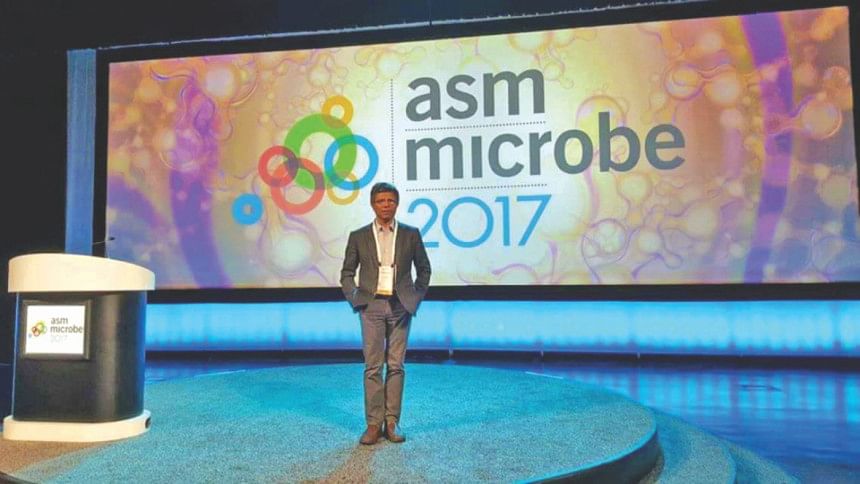Global accolade for a Bangladeshi microbiologist

Each year American Society for Microbiology (ASM) recognizes some renowned scientists for their outstanding contribution in microbiology. This year Professor Samir Kumar Saha, Ph.D., Head of the Department of Microbiology of Dhaka Shishu Hospital and Executive Director of Child Health Research Foundation (CHRF) got awarded for research in clinical microbiology. This is a great honor as a distinguished scientist for research accomplishments that form the foundation for important applications in clinical microbiology.
Dr. Saha, who is a member of Pneumococcal Awareness Council of Experts (PACE) is globally very renowned for his work in diseases like pneumonia, meningitis, typhoid. He is also a member of scientific committee of World Society of Paediatrics Infectious Diseases (WSPID) and a council member of International Society for Infectious Diseases (ISID). He is the Chair of the Steering Committee of Coalition Against Typhoid (CAT). He has more than 150 publications in the peer reviewed journals.
Dr. Saha leads a group of microbiologists, physicians and researchers who explore the root causes of the diseases and offer innovative and cost effective treatments guideline for hospital and community set up. They also work on how to minimize antimicrobial resistance which is a threat to the treatment of diseases. They showed through their research that community-based treatment with the first line of antibiotics was as effective as the expensive latest group of antibiotics.
Their greatest contribution was introducing vaccines for meningitis and pneumonia in the expanded program of immunization (EPI) in Bangladesh by providing evidence on the diseases. Their research evidence is not only being used in Bangladesh, but also in other countries in the South Asia. As Dr. Saha told — he did not keep his work confined in clinical microbiology but expanded in the field of public health.
Dr. Saha was the Principal Investigator of the multi-site and multi-country project on Aetiology of Neonatal Infection in South Asia (ANISA) project, supported by the Bill and Melinda Gates Foundation. It was one of the largest studies on childhood infections. The study involved 100,000 and 80,000 children in several countries of South Asia. The project determined the population-based incidence, etiology and antibiotic resistance profiles of community-acquired young infant infections in Bangladesh, India, and Pakistan using community-based surveillance and standard and new diagnostic tests. The project also aimed to identify risk factors for acquiring laboratory-confirmed infections and to describe clinical predictors of laboratory confirmed infections.
Dr. Saha's team also works on innovative rapid diagnostic tools for patient services, data validation and impact study of newly introduced vaccines. They also provide support in monitoring and training of several carriage studies of pneumococcus (bacteria causing pneumonia) in India.
Dr. Saha emphasized on the rational use of antibiotics to reduce antimicrobial resistance which is the next big threat for the treatment of childhood illness. He urged physicians and patients to be cautious using the antibiotics.
E-mail: [email protected]

 For all latest news, follow The Daily Star's Google News channel.
For all latest news, follow The Daily Star's Google News channel. 



Comments